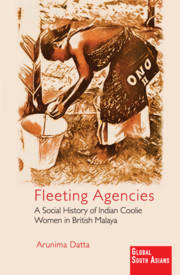Book contents
- Frontmatter
- Dedication
- Contents
- List of Tables
- List of Figures
- List of Abbreviations
- Acknowledgments
- Introduction
- 1 Coolie Women in the Empire’s Rubber Garden: Historical and Contextual Background
- 2 “Tapping” Resources: (Re)Figuring the Labor of Coolie Women on Estates
- 3 Managing “Partnerships”: Domesticity and Entrepreneurial Endeavors
- 4 Negotiating Intimacies and Moralities: Enticements, Desertions, Violence, and Gendered Trials
- 5 Becoming “Ranis”: Coolie Women as Rani Jhansi Regiment Recruits in World War II
- Conclusion
- Epilogue
- Glossary
- Notes
- Bibliography
- Index
2 - “Tapping” Resources: (Re)Figuring the Labor of Coolie Women on Estates
Published online by Cambridge University Press: 31 December 2020
- Frontmatter
- Dedication
- Contents
- List of Tables
- List of Figures
- List of Abbreviations
- Acknowledgments
- Introduction
- 1 Coolie Women in the Empire’s Rubber Garden: Historical and Contextual Background
- 2 “Tapping” Resources: (Re)Figuring the Labor of Coolie Women on Estates
- 3 Managing “Partnerships”: Domesticity and Entrepreneurial Endeavors
- 4 Negotiating Intimacies and Moralities: Enticements, Desertions, Violence, and Gendered Trials
- 5 Becoming “Ranis”: Coolie Women as Rani Jhansi Regiment Recruits in World War II
- Conclusion
- Epilogue
- Glossary
- Notes
- Bibliography
- Index
Summary
We tapped, weeded and made rubber. We made this land the rubber king! But it is we who are forgotten.
—Pachaimmal, former coolie woman on Sungai Buaya estate, 2011This is how Pachaimmal chooses to remember the contribution she and other coolie women made to the rubber industry in British Malaya. Sharing the pain of anonymity and lack of acknowledgment, Pachaimmal's words serve as a reminder of the experiences and crucial role of coolie women as laborers on rubber estates. Even a cursory glance at relevant administrative reports dealing with Indian labor in Malaya, including the annual reports of the Labor Department of the Malayan government, show that female coolies were counted and recorded as individuals whom the planters employed as laborers in their own right and not as parts of family units. Every coolie woman featured individually on estate payrolls with their own wages according to the labor they produced for the estates. But this crucial aspect of coolie women's identity usually remains silenced in both colonial and Indian nationalist discourses concerning estate labor in British Malaya. Rather, both planters’ memoirs and Indian nationalist literature, which have become primary sources for understanding coolie societies, highlighted only the victimhood of coolie women, whether in relation to abuse by coolie men or capitalist and colonial exploitation. While administrative records were accessed primarily by government officials, memoirs and other colonial literature, such as newspaper articles as well as nationalist literature, were accessible to the public, making them much more influential on public imaginations. Undeniably, these depictions portrayed certain realities of estate life, but in leaving out the agency of coolie women, they also left out many shades of these women's experiences and many dimensions of their identities.
Before progressing, it will be worthwhile to gauge a few examples of the representation of coolie women in popular colonial and nationalist discourses concerning British Malaya. Planters or plantation staff, in their memoirs and novels, often portrayed coolie women as dehumanized objects and, in other instances, described them as victims of coolie men or kanganies, who, according to the planters, treated coolie women ruthlessly. These narratives conveniently left out the role of planters in abusing and exploiting coolie women, but they also left out any explicit discussion about the importance of the active role of coolie women as laborers on estates.
- Type
- Chapter
- Information
- Fleeting AgenciesA Social History of Indian Coolie Women in British Malaya, pp. 48 - 77Publisher: Cambridge University PressPrint publication year: 2021



